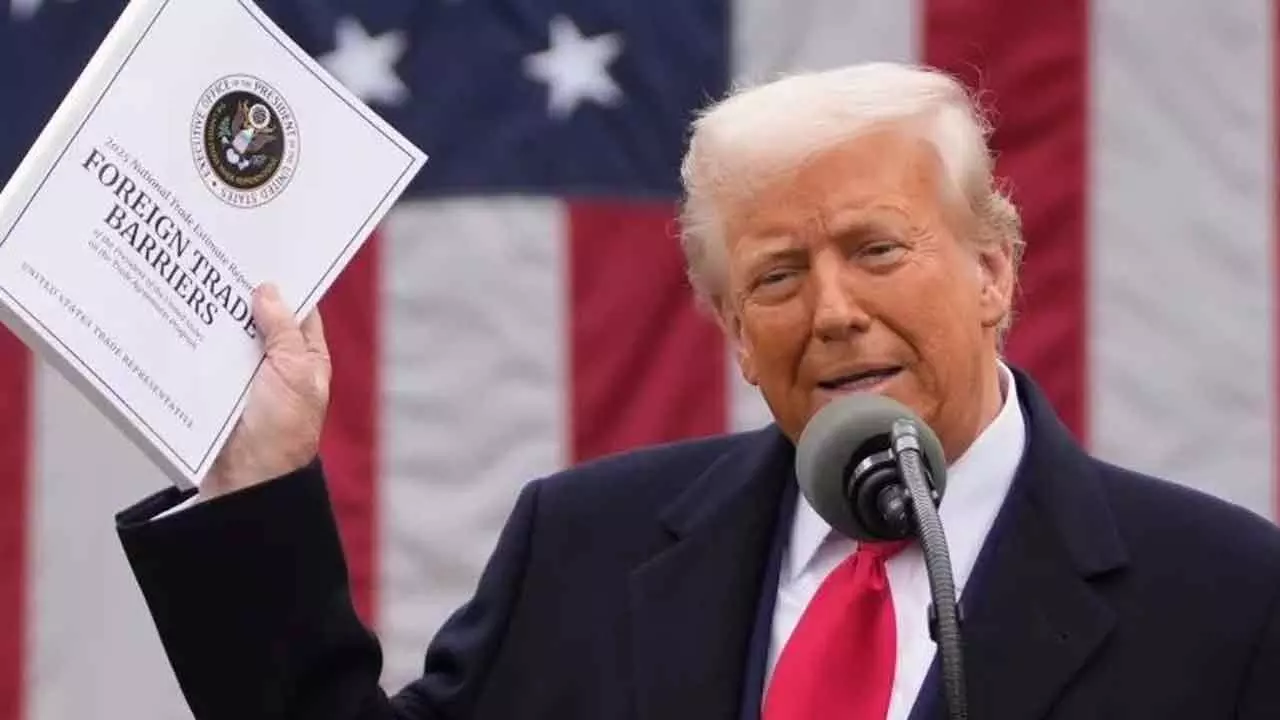Global Trade, Equity Markets, Bonds And Dollar Badly Hit By Trump’s Reciprocal Tornado
China realises that there will not be any winner in the battle for one-upmanship with the US
Global Trade, Equity Markets, Bonds And Dollar Badly Hit By Trump’s Reciprocal Tornado

It is to be watched how Trump and his team will finalise bilateral negotiations and treaty with more than 90 countries within 90 days
Since imposing reciprocal discounted tariffs on various countries at different rates, USA’s major trade partner Euro retaliated with 25 per cent tariff on imports from US which later European Union. However, it has kept the decision in abeyance.
Meanwhile, China imposed retaliatory tariffs and in spite of US President Donald Trump's threat to reverse such retaliatory tariffs, Beijing has not responded favourably. As an immediate measure, Washington imposed higher tariffs only to see China retaliate with similar tariffs, which is currently at 125 per cent.
Even though there has been rumbling within the Trump administration with many contending that the policy of reciprocal discounted tariffs was not the right approach, there has not been any reversal except for granting a 90-day reprieve.
As far as China is concerned, in the battle for one-upmanship against the US, it realizes that at the end of an intense trade tariff war there will not be any winner.
The world is keenly watching if there is any chance of both sides coming to the negotiating table and put an end to trade disorder given that there will be substantial supply chain disturbance. Both stand to lose in such a mindboggling scenario that would hit the GDP growth of all countries.
China’s international trade getting affected badly will have a negative impact on domestic manufacturing sector as well on its economy despite the recent economic boost. Moreover, there is a possibility that China may try to ship goods from friendly countries which may result in further tariffs from USA on countries helping China. There is also a fear that it could dump goods in some countries, including India.
When it comes to supply of oil, USA has already announced that additional tariffs of 25 per cent will be imposed on all goods imported into the United States from any country that imports Venezuelan oil, either directly or indirectly. This measure will also affect the current oil supply chain.
Even though the impact on equity markets world over was severe in the beginning, the equity market had a reasonable recovery. American people, who majorly depend, on equity market for their wealth creation, feel that the tariffs war is not conducive to the market as they have lost quite a bit of their wealth thereby creating dissent and dissatisfaction among them even though Trump had mentioned that the short-term pain was worth the effort. This, he said, would rectify the current imbalance amongst trading partners. The ‘America First’ policy will bolster manufacturing to substantial levels.
With the likely recession and inflation, which may lead to Federal Reserve to increase interest rates and high US debt, which is more than 120 per cent of its national income. There is a fear that the value of the US dollar will also be affected. The dollar index is already declining while gold is gaining.
The April 11 JP Morgan Wealth management report mentions five takeaways from the tariff tiff-1: Stock markets hate tariffs, as the current tariff structure though kept in abeyance, will wipe out most of the real economic and S&P earning growth; 2: Global investors are asking questions about US assets and the goal of the White House trade policy; 3: Market volatility can drive a policy response as there are chances of further de-escalation before the courts weigh in as the tariffs imposed are not as per the International Emergency Economic Powers Act; 4: The volatility creates opportunities across the risk spectrum and 5: Market timing is futile and staying invested is paramount as even if it takes three years to regain highs.
It is to be watched how Trump and his team will finalise bilateral negotiations and treaty with more than 90 countries within 90 days. One is keen on seeing if the US will prioritise major stakeholders like EU and India. There is a likelihood that India would expedite and forge a formal mutually beneficial interim arrangement with the USA. We will have to watch how Chain will react in the days ahead and would it would come the negotiating table with the US.
(The author is former Chairman & Managing Director of Indian Overseas Bank)

